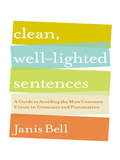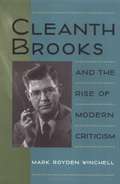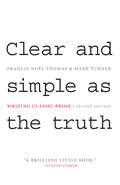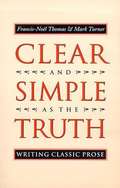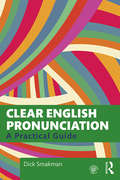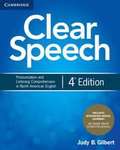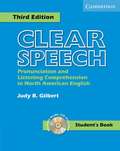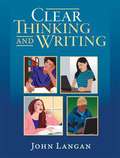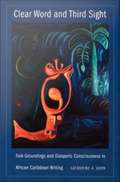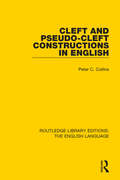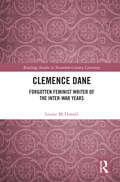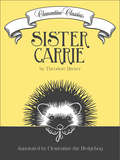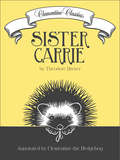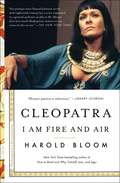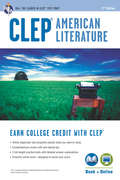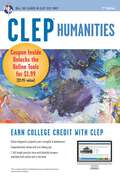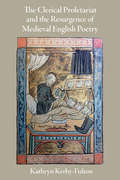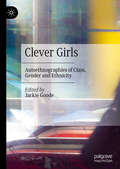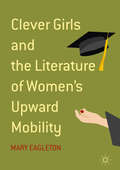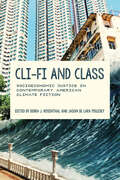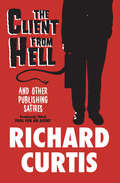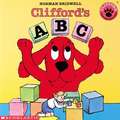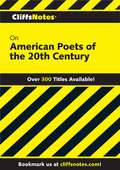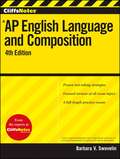- Table View
- List View
Clean, Well-Lighted Sentences: A Guide to Avoiding the Most Common Errors in Grammar and Punctuation
by Janis BellAn extraordinary handbook: with clarity and humor, it tells the story that even good writers have been longing to hear. This is not a comprehensive tracking of every nut and bolt that ever came loose within an English sentence; it is a focused discussion of the narrow range of problems that American writers typically face. From confusion over grammar to tangles with usage, to questions about punctuation, Janis Bell addresses them with transparency and grace. She discusses the issues, gives plenty of examples, provides quizzes and answers, and makes sure that readers are engaged throughout.
Cleanth Brooks and the Rise of Modern Criticism
by Mark Royden WinchellFrom the preface: "Cleanth Brooks (1906-94) was probably the most important literary critic to come to prominence during the second third of the twentieth century. In the generation before him, such pioneers as T. S. Eliot, I. A. Richards, and John Crowe Ransom helped fashion a criticism sophisticated enough to explain the radical innovations being wrought in poetry and fiction. (This approach to literary interpretation came to be called the "new criticism" simply because Ransom had given that innocuous title to a book he published in 1941.) Brooks applied the methods of this new criticism, not only to the modernist texts for which they were created, but to the entire canon of English poetry from John Donne to William Butler Yeats. In his many critical works, especially The Well Wrought Urn and the textbooks he edited with Robert Penn Warren and others, Brooks taught several generations of students how to read literature without prejudice or preconception. In addition to these achievements, Brooks helped invent the modern literary quarterly and wrote the best book yet on the works of William Faulkner."
Clear and Simple as the Truth: Writing Classic Prose
by Francis-Noël Thomas Mark TurnerFor more than a decade, Clear and Simple as the Truth has guided readers to consider style not as an elegant accessory of effective prose but as its very heart. Francis-Noël Thomas and Mark Turner present writing as an intellectual activity, not a passive application of verbal skills. In classic style, the motive is truth, the purpose is presentation, the reader and writer are intellectual equals, and the occasion is informal. This general style of presentation is at home everywhere, from business memos to personal letters and from magazine articles to student essays. Everyone talks about style, but no one explains it. The authors of this book do; and in doing so, they provoke the reader to consider style, not as an elegant accessory of effective prose, but as its very heart. At a time when writing skills have virtually disappeared, what can be done? If only people learned the principles of verbal correctness, the essential rules, wouldn't good prose simply fall into place? Thomas and Turner say no. Attending to rules of grammar, sense, and sentence structure will no more lead to effective prose than knowing the mechanics of a golf swing will lead to a hole-in-one. Furthermore, ten-step programs to better writing exacerbate the problem by failing to recognize, as Thomas and Turner point out, that there are many styles with different standards. The book is divided into four parts. The first, "Principles of Classic Style," defines the style and contrasts it with a number of others. "The Museum" is a guided tour through examples of writing, both exquisite and execrable. "The Studio," new to this edition, presents a series of structured exercises. Finally, "Further Readings in Classic Prose" offers a list of additional examples drawn from a range of times, places, and subjects. A companion website, classicprose.com, offers supplementary examples, exhibits, and commentary, and features a selection of pieces written by students in courses that used Clear and Simple as the Truth as a textbook.
Clear and Simple as the Truth
by Francis-Noël Thomas Mark TurnerEveryone talks about style, but no one explains it. The authors of this book do; and in doing so, they provoke the reader to consider style, not as an elegant accessory of effective prose, but as its very heart. At a time when writing skills have virtually disappeared, what can be done? If only people learned the principles of verbal correctness, the essential rules, wouldn't good prose simply fall into place? Thomas and Turner say no. Attending to rules of grammar, sense, and sentence structure will no more lead to effective prose than knowing the mechanics of a golf swing will lead to a hole-in-one. Furthermore, ten-step programs to better writing exacerbate the problem by failing to recognize, as Thomas and Turner point out, that there are many styles with different standards. In the first half ofClear and Simple,the authors introduce a range of styles--reflexive, practical, plain, contemplative, romantic, prophetic, and others--contrasting them to classic style. Its principles are simple: The writer adopts the pose that the motive is truth, the purpose is presentation, the reader is an intellectual equal, and the occasion is informal. Classic style is at home in everything from business memos to personal letters, from magazine articles to university writing. The second half of the book is a tour of examples--the exquisite and the execrable--showing what has worked and what hasn't. Classic prose is found everywhere: from Thomas Jefferson to Junichiro Tanizaki, from Mark Twain to the observations of an undergraduate. Here are many fine performances in classic style, each clear and simple as the truth.
Clear English Pronunciation: A Practical Guide
by Dick SmakmanClear English Pronunciation provides students with the tools to effectively communicate in English without centring solely on native-speaker pronunciation models. The focus of the book is on individual pronunciation targets rather than a one-size-fits-all approach. Divided into four sections, each featuring detailed articulatory explanations, sample sentences, and recordings to help learners improve their pronunciation, this book: introduces the phenomenon of pronunciation as part of a broader communicative realm; explains and demonstrates the melody and rhythm of understandable and natural English pronunciation; supports students in identifying and practicing their own pronunciation issues. Supported by an interactive companion website which features recordings and expanded explanations of key topics, Clear English Pronunciation is an essential textbook for international learners of English who want to improve their pronunciation skills in diverse social settings. https://www.universiteitleiden.nl/clearenglishpronunciation
Clear Speech: Pronunciation and Listening Comprehension in North American English (4th Edition)
by Judy B. GilbertThe Clear Speech, Fourth Edition, Student's Book provides easy-to-follow presentations, helpful rules, and extensive practice in pronunciation. This revised edition offers new and updated content, additional visual support, and is now in full color.
Clear Speech: Pronunciation and Listening Comprehension in North American English (3rd Edition)
by Judy B. GilbertThis book is designed to help students make the most efficient use of their time as they learn to pronounce English better.
Clear Thinking and Writing
by John LanganProvides points and support to the need of becoming a better thinker and writer. The first three chapters provide the reason of why you need to clearly understand the difference between point and support; chapter 4 the common mistakes writers make, chapter 5 order of organizing the support for a point Chapter 6 difference between a paragraph and an essay Chapter 7 Writing process steps Chapter 8 Writing Assessments for an opportunity to practice what you've learnt and the interesting topics to indulge in
Clear Word and Third Sight: Folk Groundings and Diasporic Consciousness in African Caribbean Writing
by Catherine A. JohnClear Word and Third Sight examines the strands of a collective African diasporic consciousness represented in the work of a number of Black Caribbean writers. Catherine A. John shows how a shared consciousness, or "third sight," is rooted in both pre- and postcolonial cultural practices and disseminated through a rich oral tradition. This consciousness has served diasporic communities by creating an alternate philosophical "worldsense" linking those of African descent across space and time. Contesting popular discourses about what constitutes culture and maintaining that neglected strains in negritude discourse provide a crucial philosophical perspective on the connections between folk practices, cultural memory, and collective consciousness, John examines the diasporic principles in the work of the negritude writers Lon Damas, Aim Csaire, and Lopold Senghor. She traces the manifestations and reworkings of their ideas in Afro-Caribbean writing from the eastern and French Caribbean, as well as the Caribbean diaspora in the United States. The authors she discusses include Jamaica Kincaid, Earl Lovelace, Simone Schwarz-Bart, Audre Lorde, Paule Marshall, and Edouard Glissant, among others. John argues that by incorporating what she calls folk groundings--such as poems, folktales, proverbs, and songs--into their work, Afro-Caribbean writers invoke a psychospiritual consciousness which combines old and new strategies for addressing the ongoing postcolonial struggle.
Clearing The Way: Working With Teenage Writers
by Tom RomanoClearing the Way is written for English teachers whose job is to help teenagers become better writers. Tom Romano, a full time high school English teacher when he wrote this book, has worked with hundreds of teenage writers. He knows well the problems and triumphs of teaching writing. In Clearing the Way teachers will find specific ideas and strategies, a workable philosophy for teaching writing, and, best of all, vivid stories and case histories of real teenagers. Romano discusses the importance of respecting students' words, the use of writing to learn and discover, the teacher-student conference, writing processes in theory and practice, the evaluation and grading of writing, the place of writing in literature classes, and the powerful creative current that can be transmitted among teenage writers. Whatever the topic, Romano illustrates his ideas with many examples of teenagers' own writing.
Cleft and Pseudo-Cleft Constructions in English (Routledge Library Editions: The English Language #6)
by Peter C. CollinsFirst published in 1991, this book examines the communicative properties of ‘cleft’ and ‘pseudo-cleft’ constructions in contemporary English. The book argues that these properties cannot be ignored in any attempt to provide an adequate grammatical description of the constructions. Furthermore, they provide a source of explanations for the patterns of stylistic variation displayed by clefts and pseudo-clefts. The book reports findings from a corpus-based study of clefts and pseudo-clefts in modern British English.
Clemence Dane: Forgotten Feminist Writer of the Inter-war Years (Routledge Studies in Twentieth-Century Literature)
by Louise McDonaldThis feminist investigation of the works of Clemence Dane joins the growing body of research into the relationship of female-authored texts to the ideology and cultural hegemony of the Edwardian and inter-war period. An amalgam of single-author study and thematic period analysis, through sustained cultural engagement, this book explores Dane’s journalism, drama and fiction to interrogate a range of issues: inter-war women’s writing, the Middlebrow, feminism, (homo) sexuality, liberal politics, domesticity, and concepts of the spinster. It examines form and a range of fictional genres: drama, bildungsroman, detective fiction, historical saga and gothic fiction. It relates back to the genre writing of comparable authors. These include Rosamond Lehmann, Vita Sackville-West, Ivy Compton-Burnett, Dorothy Strachey, Dodie Smith, Rachel Ferguson, May Sinclair, Sylvia Townsend Warner, Daphne Du Maurier, G.B.Stern, and detective writers: Dorothy L. Sayers, Agatha Christie, Gladys Mitchell, Marjorie Allingham and Ngaio Marsh. Offering a picture of an era, focalised through Dane and contextualised through her journalism and the work of her female peers, it argues that Dane is often markedly more radically feminist than these contemporaries. She engages with broad issues of social justice irrespective of gender and her humanity is demonstrated through her sympathetic representations of marginalised characters of both sexes. However, she most specifically evidences a gender politics consistent with the fragmented and multifarious essentialist feminism that emerged following the Great War, which esteemed ‘womanly’ qualities of care and mothering but simultaneously valued female autonomy, single status and professionalism. Adopting the critical paradigms of domestic modernism and women‘s liminality, the book will particularly focus on the trajectories of Dane’s extraordinary modern heroines, who possess qualities of altruism, candour, integrity, imagination, intuition, resilience and rebelliousness. Over the course of her work, these fictional women increasingly challenge oppressive normative forms of domesticity, traversing physical thresholds to create alternative domesticities in self-defining living and working spaces.
Clementine Classics: Sister Carrie by Theodore Dreiser
by Clementine The HedgehogSometimes reading the classics is a chore, but not so with the snarky annotations by Clementine the Hedgehog. Having made her debut as a weekly book reviewer of note on Tumblr in 2012, Clem now takes on Sister Carrie by Theodore Dreiser. On each page, she inserts her keen insights, dark sense of humor, and cut-the-crap commentary, crafting a 21st-century literary criticism for distraction addicts everywhere. "This is obviously my favorite review to date, as it was WRITTEN BY A HEDGEHOG, and COMES WITH A HEDGEHOG GIF."-Emma Straub"Tumblr book review series of the year."-Rachel Fershleiser, head of Tumblr literary outreachClementine Classics, a new series from Black Balloon Publishing, gives classic works of literature the contemporary annotations they deserve. Obsessed, possessed, and thoroughly distressed by the originals, today's writers riff, rant, praise, and flay these old books, giving them new life. The series' beautifully designed e-books are both an act of sincere literary criticism and a new, composite form of humor writing.
Clementine Classics: Sister Carrie by Theodore Dreiser
by Theodore Dreiser Clementine The HedgehogSometimes reading the classics is a chore, but not so with the snarky annotations by Clementine the Hedgehog. Having made her debut as a weekly book reviewer of note on Tumblr in 2012, Clem now takes on Sister Carrie by Theodore Dreiser. On each page, she inserts her keen insights, dark sense of humor, and cut-the-crap commentary, crafting a 21st-century literary criticism for distraction addicts everywhere. "This is obviously my favorite review to date, as it was WRITTEN BY A HEDGEHOG, and COMES WITH A HEDGEHOG GIF."-Emma Straub"Tumblr book review series of the year."-Rachel Fershleiser, head of Tumblr literary outreachClementine Classics, a new series from Black Balloon Publishing, gives classic works of literature the contemporary annotations they deserve. Obsessed, possessed, and thoroughly distressed by the originals, today's writers riff, rant, praise, and flay these old books, giving them new life. The series' beautifully designed e-books are both an act of sincere literary criticism and a new, composite form of humor writing.
Cleopatra: I Am Fire and Air (Shakespeare's Personalities #2)
by Harold BloomFrom Harold Bloom, one of the greatest Shakespeare scholars of our time, comes an intimate, wise, deeply compelling portrait of Cleopatra—one of the Bard’s most riveting and memorable female characters.Cleopatra is one of the most famous women in history—and thanks to Shakespeare, one of the most intriguing personalities in literature. She is lover of Marc Antony, defender of Egypt, and, perhaps most enduringly, a champion of life. Cleopatra is supremely vexing, tragic, and complex. She has fascinated readers and audiences for centuries and has been played by the greatest actresses of their time, from Elizabeth Taylor to Vivien Leigh to Janet Suzman to Judi Dench. Award-winning writer and beloved professor Harold Bloom writes about Cleopatra with wisdom, joy, exuberance, and compassion. He also explores his own personal relationship to the character: Just as we encounter one Anna Karenina or Jay Gatsby when we are in high school and college and another when we are adults, Bloom explains his shifting understanding of Cleopatra over the course of his own lifetime. The book becomes an extraordinarily moving argument for literature as a path to and a measure of our own humanity. Bloom is mesmerizing in the classroom, wrestling with the often tragic choices Shakespeare’s characters make. With Cleopatra, he delivers exhilarating clarity and invites us to look at this character as a flawed human who might be living in our world. The result is an invaluable resource from our greatest literary critic.
CLEP® American Literature Book + Online (CLEP Test Preparation)
by Jacob StratmanEarn College Credit with REA's Test Prep for CLEP® American Literature Everything you need to pass the exam and get the college credit you deserve.CLEP® is the most popular credit-by-examination program in the country, accepted by more than 2,900 colleges and universities. For over 15 years, REA has helped students pass the CLEP® exam and earn college credit while reducing their tuition costs. Our CLEP® test preps are perfect for adults returning to college (or attending for the first time), military service members, high-school graduates looking to earn college credit, or home-schooled students with knowledge that can translate into college credit. There are many different ways to prepare for the CLEP® exam. What's best for you depends on how much time you have to study and how comfortable you are with the subject matter. Our test prep for CLEP® American Literature and the free online tools that come with it, will allow you to create a personalized CLEP® study plan that can be customized to fit you: your schedule, your learning style, and your current level of knowledge.Here's how it works:Diagnostic exam at the REA Study Center focuses your studyOur online diagnostic exam pinpoints your strengths and shows you exactly where you need to focus your study. Armed with this information, you can personalize your prep and review where you need it the most. Most complete subject review for CLEP® American Literature Our targeted review covers the material you'll be expected to know for the exam and includes a glossary of must-know terms. Two full-length practice examsThe online REA Study Center gives you two full-length practice tests and the most powerful scoring analysis and diagnostic tools available today. Instant score reports help you zero in on the CLEP® American Literature topics that give you trouble now and show you how to arrive at the correct answer - so you'll be prepared on test day. REA is the acknowledged leader in CLEP® preparation, with the most extensive library of CLEP® titles available. Our test preps for CLEP® exams help you earn valuable college credit, save on tuition, and get a head start on your college degree.
CLEP® Humanities Book + Online (CLEP Test Preparation)
by Robert Liftig Marguerite BarrettEarn College Credit with REA’s Test Prep for CLEP Humanities Everything you need to pass the exam and get the college credit you deserve. REA leads the way in helping students pass their College Board CLEP exams and earn college credit while reducing their tuition costs. With 25+ years of experience in test prep for the College-Level Examination Program (CLEP), REA is your trusted source for the most up-to-date test-aligned content. Whether you’re an adult returning to finish your degree, a traditional-age college student, a military service member, or a high school or home-schooled student looking to get a head start on college and shorten your path to graduation, CLEP is perfect for you. REA’s expert authors know the CLEP tests inside out. And thanks to our partners at Proctortrack (proctortrack.com/clep), you can now take your exam at your convenience, from the comfort of home. Prep for success on the CLEP Humanities exam with REA’s personalized three-step plan: (1) focus your study, (2) review with the book, and (3) measure your test-readiness. Our Book + Online prep gives you all the tools you need to make the most of your study time: Diagnostic exam: Pinpoint what you already know and what you need to study.Targeted subject review: Learn what you’ll be tested on.Two full-length practice exams: Zero in on the topics that give you trouble now so you’ll be confident and prepared on test day.Glossary of key terms: Round out your prep with must-know vocabulary.REA is America’s recognized leader in CLEP preparation. Our test prep helps you earn valuable college credit, save on tuition, and accelerate your path to a college degree.
The Clerical Proletariat and the Resurgence of Medieval English Poetry (The Middle Ages Series)
by Kathryn Kerby-FultonDespite the great literary achievements of Chaucer, Langland, and the Pearl Poet, Ricardian English books were still a niche market in 1400. As Kathryn Kerby-Fulton shows, however, their generation was transformational in nurturing the resurgence of English writing, in part as a result of the mass underemployment of clerks originally trained for the church but unable to find steady positions in it. Surviving instead as ecclesiastical or choral "piece workers," or in secular jobs in government or private households, this "clerical proletariat" lived and worked in liminal spaces between the ecclesiastical and lay world. And there the most enterprising found new material—and new audiences—for poetry in English.Since English book production in London prior to 1380 was rare, Kerby-Fulton's study begins in the prior century with great regional poets, revealing their early experimentation with a new poetics of vocational crisis. Preoccupied with underemployment, patronage, careerist ambition, alienation, and changing literary fashion, these thirteenth-century writers were choosing the more avant garde option of writing in English while feeling backwards to earlier tradition in works such as Laȝamon's Brut and The Owl and the Nightingale. These early experimenters invoked semi-remembered literary forms in a still evolving written vernacular, breaking ground for Ricardian writers, who turned to these conventions during the massive clerical unemployment of the Great Schism era. Kerby-Fulton's is the first study of Langland's legacy of articulating an authorial employment crisis, and its echoes in Hoccleve and Audelay. It also uses new tools for uncovering proletarian writers in unattributed Middle English works, including the famous Harley 2253 lyrics, the "York Realist's" Second Trial from the York Cycle, St. Erkenwald, and Wynnere and Wastour. Taking in proletarian themes, including class, meritocracy, the abuse of children ("Choristers' Lament"), the gig economy, precarity, and the breaking of intellectual elites (Book of Margery Kempe), The Clerical Proletariat and the Resurgence of Medieval English Poetry speaks to both past and present employment urgencies.
Clever Girls: Autoethnographies of Class, Gender and Ethnicity
by Jackie GoodeThis collection by three generations of women from predominantly working-class backgrounds explores the production of the classed, gendered and racialized subject with powerful, engaging, funny and moving stories of transitions through family relationships, education, friendships and work. The developments that take place across a life in processes of ‘becoming’ are examined through the fifteen autoethnographies that form the core of the book, set within an elaboration of the social, educational and geo-political developments that constitute the backdrop to contributors’ lives. Clever Girls discusses the status of personal experience as ‘research data’ and the memory work that goes into the making of autoethnography-as-poiesis. The collection illustrates the huge potential of autoethnography as research method, mode of inquiry and creative practice to illuminate the specificities and commonalities of experiences of growing up as ‘clever girls’ and to sound a ‘call to action’ against inequality and discrimination.
Clever Girls and the Literature of Women's Upward Mobility
by Mary EagletonThis book follows the figure of ‘the clever girl’ from the post-war to the present and focuses on the fiction, plays and memoirs of contemporary British women writers. Spurred on by an ethic of meritocracy, the clever girl is now facing austerity and declining social mobility. Though suggesting optimism, a public discourse of ‘opportunity’, ‘aspiration’ and ‘choice’ is often experienced as an anxious and chancy process. In a wide-ranging study, the book explores the struggle to move away from home and traditional notions of femininity; the persistent problems associated with women’s embodiment; the pressures of class and racial divisions; the new subjectivities of the neoliberal era; and the generational conflict underpinning austerity. The book ends with a consideration of feminism’s place as a phantom presence in this history of clever girls. This study will appeal to readers of contemporary women’s writing and to those interested in what has been one of the dominant social narratives of the post-war period from upward to declining mobility.
Cli-Fi and Class: Socioeconomic Justice in Contemporary American Climate Fiction (Under the Sign of Nature)
by Lisa Ottum Martín Premoli B. Jamieson Stanley Jessica Cory Jennifer Horwitz Professor Jennifer Schell Kimberly Bain Andrew Milner Jeffrey M. Brown Matthew Schneider-Mayerson Magdalena Maczynska Teresa Goddu Adam TrexlerSince its emergence in the late twentieth century, climate fiction—or cli-fi—has concerned itself as much with economic injustice and popular revolt as with rising seas and soaring temperatures. Indeed, with its insistent focus on redressing social disparities, cli-fi might reasonably be classified as a form of protest literature. As environmental crises escalate and inequality intensifies, literary writers and scholars alike have increasingly scrutinized the dual exploitations of the earth&’s ecosystems and the socioeconomically disadvantaged. Cli-Fi and Class focuses on the representation of class dynamics in climate-change narratives. With fifteen essays on the intersection of the economic and the ecological—addressing works ranging from the novels of Joseph Conrad, Cormac McCarthy, and Octavia Butler to the film Black Panther and the Broadway musical Hadestown —this collection unpacks the complex ways economic exploitation impacts planetary well-being, and the ways climatic change shapes those inequities in turn.
The Client from Hell and Other Publishing Satires: And Other Publishing Satires
by Richard CurtisPreviously titled FOOL FOR AN AGENT. An alien space explorer seeking intelligent worlds discovers one inhabited by life forms known as publishers, and concludes that this world is not worth another visit; another voyager lands on Earth and selects a literary agent to represent his book and movie rights; a freelance writer is so outraged over a lousy royalty statement, he drills his publisher with a gun. These are just a few glimpses of this hilarious collection of lampoons of the publishing industry by prominent literary agent Richard Curtis. Never again will you look at your editor with a straight face.
Clifford's Abc
by Norman BridwellEveryone's favourite red dog teaches the ABC's in his own playful manner.
CliffsNotes American Poets of the 20th Century
by Mary Ellen SnodgrassThis literary companion carries you into the lives and poetic lines of 41 of America's most admired poets from the last century. From popular favorites such as Robert Frost and Carl Sandburg to the more esoteric T. S. Eliot and Ezra Pound, this handbook also introduces you to living poets, such as Rita Dove, who are still inscribing their places in literary history. The book opens with an approach to analyzing poetry, and each author-specific chapter includes sections devoted to Chief Works, Discussion and Research Topics, and a Selected Bibliography.Complete list of authors covered in this comprehensive guide: Edgar Lee Masters, Edward Arlington Robinson, Robert Frost, Amy Lowell, Carl Sandburg, Wallace Stevens, William Carlos Williams, Ezra Pound, Hilda Doolittle (H. D.), Robinson Jeffers, Marianne Moore, T. S. Eliot, John Crowe Ransom, Edna St. Vincent Millay, Jean Toomer, Louise Bogan, Hart Crane, Allen Tare, Sterling Brown, Langston Hughes, Countée Cullen, Elizabeth Bishop, John Berryman, Randall Jarrell, Gwendolyn Brooks, Robert Lowell, Richard Wilbur, James Dickey, Denise Levertov, A.R. Ammons, Allen Ginsberg, W. S. Merwin, James Wright, Anne Sexton, Adrienne Rich, Sylvia Plath, Amiri Baraka, Wendy Rose, Joy Harjo, Rita Dove, Cathy Song
CliffsNotes AP English Language and Composition, 4th Edition
by Barbara V. SwovelinA new edition of the bestselling AP English Language from CliffsNotes includes introductory chapters on the different question types you'll encounter on the exam. Features four full-length practice exams with detailed answer explanations and model essay responses.
